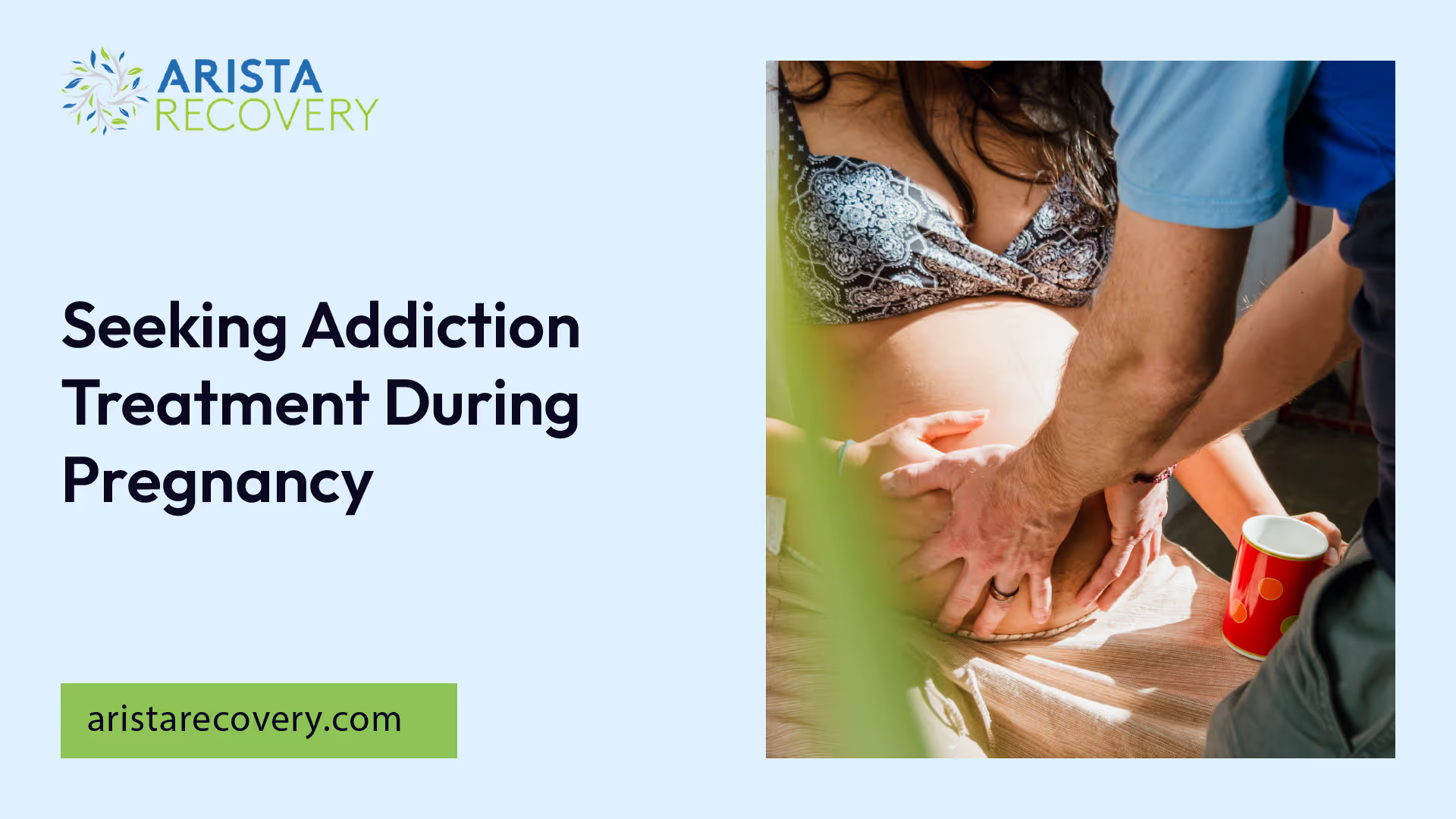Seeking Addiction Treatment During Pregnancy

Seeking Addiction Treatment During Pregnancy
Choosing to seek help for substance use while pregnant can be a challenging yet important decision. The substance abuse landscape is multifaceted, with an increasing number of individuals reaching out for assistance. In 2020, SAMHSA's National Helpline received 833,598 calls, showing a 27 percent increase from 2019 when it received 656,953 calls for the year.

Impact of Substance Use on Pregnancy
Substance use during pregnancy can have significant health implications for both the mother and the unborn child. Various substances, including tobacco, marijuana, prescription pain relievers, and illegal drugs, can pose serious risks during pregnancy.
According to the National Institute on Drug Abuse (NIDA), smoking tobacco or marijuana, taking prescription pain relievers, or using illegal drugs during pregnancy is associated with double or even triple the risk of stillbirth.
Additionally, regular use of some drugs during pregnancy can cause neonatal abstinence syndrome (NAS), where the baby experiences withdrawal symptoms upon birth. The type and severity of an infant's withdrawal symptoms depend on various factors, including the drug(s) used, the frequency and duration of use, how the mother's body metabolizes the drug, and whether the infant was born prematurely or at full term.
Risks of Stillbirth Due to Substance Use
Substance use during pregnancy significantly increases the risk of stillbirth. Pregnant individuals who smoke tobacco or marijuana, use prescription pain relievers, or use illegal drugs face a double or even triple risk of stillbirth [2].
Furthermore, children born to mothers who both smoked and drank beyond the first trimester have a twelvefold increased risk for sudden infant death syndrome (SIDS) compared to those unexposed or only exposed in the first trimester of pregnancy.
In light of these risks, seeking addiction treatment during pregnancy is a critical step towards ensuring healthier outcomes for both the mother and the baby. Various treatment options and resources are available that are tailored specifically to the needs of pregnant individuals. These include specialized treatment programs and the involvement of primary care clinicians in managing substance use disorders during pregnancy.
Treatment Options for Pregnant Individuals
Seeking addiction treatment during pregnancy is essential for the health and well-being of both the pregnant individual and the developing fetus. Treatment can reduce the risk of adverse pregnancy outcomes and improve long-term developmental outcomes for the child.
Culturally Sensitive Resources in Canada
In Canada, culturally sensitive resources are available for pregnant individuals seeking addiction treatment. Services such as the National Native Alcohol and Drug Abuse Program and the National Youth Solvent Abuse Program provide support tailored to the unique needs and experiences of indigenous people. These programs may include traditional healing methods, community support groups, and individual counseling services.
It's vital to acknowledge the cultural and societal factors that may influence substance use and accessibility to treatment. Culturally sensitive resources can provide a more holistic and effective approach to addiction treatment during pregnancy.
Neonatal Abstinence Syndrome (NAS)
Regular use of certain drugs during pregnancy can lead to a condition known as Neonatal Abstinence Syndrome (NAS), now referred to as Neonatal Opioid Withdrawal Syndrome (NOWS). This syndrome occurs when a baby goes through withdrawal from the drug the pregnant individual was using.
The type and severity of an infant's withdrawal symptoms depend on the drug(s) used, how long and how often the birth mother used, how her body breaks the drug down, and whether the infant was born full term or prematurely.
Medication-assisted treatment during pregnancy can help manage NOWS. Treatments such as methadone and buprenorphine can decrease the severity of NOWS and improve outcomes for the newborn [4].
Substance use disorders during pregnancy present unique challenges, but with the right resources and support, recovery is possible. Culturally sensitive programs and treatments for NOWS are essential components of effective addiction treatment for pregnant individuals.
Effects of Specific Substances on Pregnancy
Addressing substance use during pregnancy is crucial due to the potential harmful effects on both the pregnant individual and the developing fetus. This section examines the impact of specific substances, including cannabis, tobacco, and alcohol.
Cannabis Use During Pregnancy
Cannabis use during pregnancy, which has increased from 3.4% to 7.0% among pregnant women overall between 2002-2003 and 2016-2017, may cause low birth weight and length. The effect is especially prominent in women who consume marijuana frequently, particularly during the first and second trimesters. Therefore, pregnant women or those contemplating pregnancy are advised to discontinue the use of marijuana for medicinal purposes and seek alternative therapies with better pregnancy-specific safety data.
Tobacco and Alcohol Use During Pregnancy
Tobacco and alcohol use during pregnancy can lead to severe complications. According to NIDA, smoking tobacco or marijuana, taking prescription pain relievers, or using illegal drugs during pregnancy is associated with double or even triple the risk of stillbirth. Furthermore, children born to mothers who both drank and smoked beyond the first trimester of pregnancy have a twelvefold increased risk for sudden infant death syndrome (SIDS) compared to those unexposed or only exposed in the first trimester of pregnancy.
Regular use of some drugs during pregnancy can cause neonatal abstinence syndrome (NAS), in which the baby goes through withdrawal upon birth. The type and severity of an infant's withdrawal symptoms depend on the drug(s) used, how long and how often the birth mother used, how her body breaks the drug down, and whether the infant was born full term or prematurely.
When seeking addiction treatment during pregnancy, it's crucial to consider the specific effects of different substances. The best course of action involves a multiprofessional treatment approach tailored to the individual's needs for the best outcomes for both mother and baby.
Managing Substance Use Disorders During Pregnancy
Addressing substance use disorders during pregnancy requires a comprehensive, multiprofessional approach to ensure the health and safety of both the mother and the child.
Multiprofessional Treatment Approach
Pregnant women with substance use disorders have multiple special needs, which might be best managed within a multiprofessional treatment setting involving medical, psychological, and social care. Careful assessment and screening are necessary to tailor interventions individually to the woman's needs in order to achieve beneficial clinical outcomes for mothers and newborns.
The effects on the fetus are highly dependent on the type and amount of substances consumed throughout pregnancy, as well as on the nutritional and health status and the wellbeing of the mother. The type and amount of interventions offered and applied to the mother therefore depend on the individual patient.
Multiprofessional treatment involving healthcare professionals from various disciplines is necessary to provide the required clinical care for the pregnant patient and her child. Medical and psychosocial interventions should be coordinated and individually tailored to each patient [5].
Screening and Treatment Recommendations
Substance use and substance use disorders in pregnancy are common and linked with multiple obstetric and neonatal adverse outcomes. Ideally, all pregnant women should be screened, and those with positive screens should be promptly diagnosed and treated to avoid the morbidity and mortality associated with continued substance use during pregnancy.
Treatment of all types of substance use disorders reduces the risk of relapse and improves pregnancy outcomes. Pregnant women who smoke or use nicotine and tobacco products should quit. Women with alcohol or benzodiazepine use disorder can be managed with detoxification using a diazepam or lorazepam taper. Medication-assisted treatment is the standard of care for pregnant women with opioid use disorder.
When seeking addiction treatment during pregnancy, it's crucial to prioritize both the health of the mother and the unborn child. By incorporating comprehensive, multiprofessional care, and following recommended screening and treatment protocols, the risks associated with substance use disorders can be significantly reduced, leading to improved pregnancy outcomes.
Improving Pregnancy Outcomes
The journey towards seeking addiction treatment during pregnancy can be a challenging one, but with the right support and resources, it is possible to improve pregnancy outcomes and ensure a healthier future for both mother and child. Specialized treatment programs and the role of primary care clinicians play a significant part in this process.
Specialized Treatment Programs
In order to cater to the unique needs of pregnant women grappling with substance use disorders, specialized treatment programs have been developed [6]. These programs offer services and support tailored to the circumstances and challenges faced by this population, addressing multiple issues such as medical and mental illnesses, disrupted relationships, and other related troubles.
The primary goal of these treatment programs is to encourage and maintain abstinence, with the majority of substance-dependent patients eventually ceasing compulsive use and experiencing less frequent and less severe relapse episodes. Studies have shown that prolonged abstinence following treatment predicts continuing success, and individuals who stay in treatment for longer periods are more likely to achieve maximum benefits.
These specialized treatment programs employ a variety of techniques such as pharmacotherapy, individual therapy, group therapy, family therapy, cognitive-behavioral therapy, and self-help groups. The combination of these techniques is aimed at addressing the specific needs of each patient and promoting successful outcomes.
Role of Primary Care Clinicians
Primary care clinicians play an integral role in the treatment process of substance use disorders during pregnancy. They are key in identifying, screening, and referring patients with substance use disorders for treatment. Furthermore, they provide ongoing support and encouragement to patients in treatment, monitor potential for relapse, and take necessary steps to prevent lapses from occurring [6].
Moreover, clinicians bear a responsibility towards patients who refuse treatment or drop out. It's their duty to continuously offer support and encourage their engagement in treatment. This continuous support from health professionals plays a significant role in improving pregnancy outcomes for women with substance use disorders.
In conclusion, improving pregnancy outcomes in women seeking addiction treatment during pregnancy involves a comprehensive approach that includes specialized treatment programs and the active involvement of primary care clinicians. With the right support, it is possible to overcome the challenges of addiction and pave the way for a healthier future for both mother and child.
References
[1]: https://www.samhsa.gov/find-help/national-helpline
[2]: https://nida.nih.gov/publications/research-reports/substance-use-in-women/substance-use-while-pregnant-breastfeeding
[3]: https://www.canada.ca/en/health-canada/services/substance-use/get-help-with-substance-use.html
[4]: https://www.ncbi.nlm.nih.gov/books/NBK542330/
You’re not alone in this.
When mental health challenges and addiction intersect, it can feel isolating. At Arista, we offer compassionate, evidence-based, and trauma-informed care to help you heal, grow, and move forward.
You’re not alone in this.
When mental health challenges and addiction intersect, it can feel isolating. At Arista, we offer compassionate, evidence-based, and trauma-informed care to help you heal, grow, and move forward.
Support that moves with you.
You’ve taken a brave first step. At Arista Recovery, we’re here to help you continue with best-in-class care designed for long-term healing and support.
.webp)






